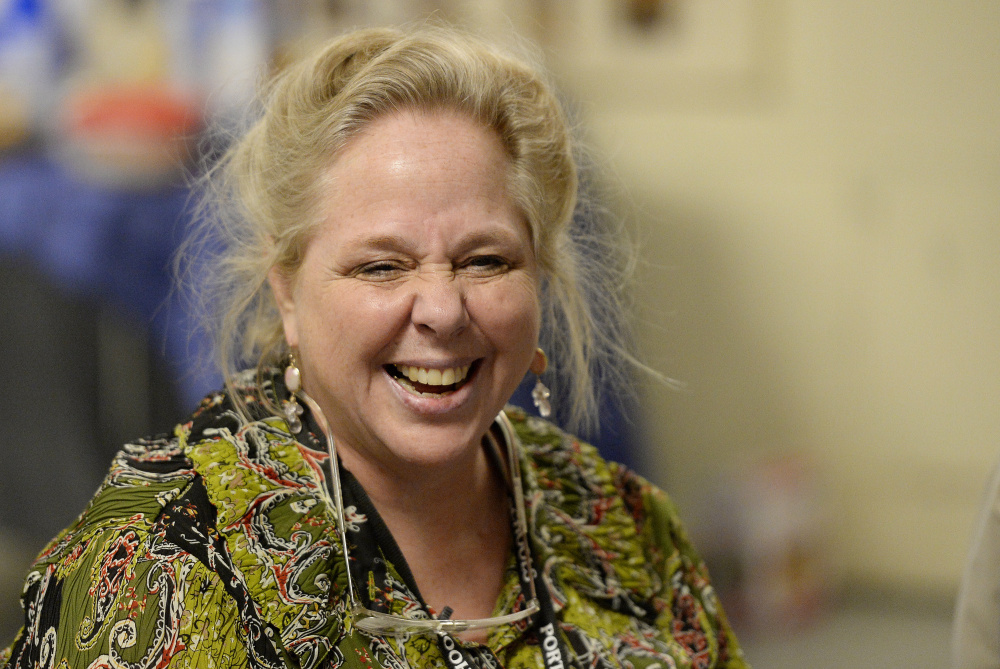Assouma Nyirabahizi left her home and job in Rwanda two years ago, coming to America on a green card in hopes of a brighter future.
Fluent in English, with a master’s degree in computer science, she still faced a surprising problem when she arrived: Her accent made it difficult for people to understand her. Now she’s one of eight students in a free accent-reduction class offered by Portland Adult Education.
“I presented my thesis in English. I got all my education in English,” Nyirabahizi, 32, says with a smile. “But here I have to learn again, because of the accent.”
Instructor Marta Greenlaw says losing an accent can have a big impact beyond the workplace – it helps her students navigate more easily throughout the community, whether it’s at the grocery store, a parent-teacher conference, a doctor’s office or just while talking to neighbors.
Greenlaw said she starts the class by drilling the students in the 44 sounds in the English language, explaining how to adopt an American accent and not just pick up regional accents. “It’s not ‘pahk the cah,’ ” she said with a laugh.
On a recent afternoon, Nyirabahizi and the other students made their first class presentations, describing a native dish they had made, the ingredients in it and how it was prepared. As they spoke, Greenlaw occasionally jumped in to emphasize the correct pronunciation of a word.
“Unnnn-yunnnnn,” she said slowly, drawing out the syllables in “onion” and emphasizing how the lips and jaw work to form the word. “Onion,” the students responded together. “Poe-tay-toe,” Greenlaw said slowly, as the students responded by saying “potato” repeatedly.
As they continued the lesson, Greenlaw pointed out that it’s not just an accent that can throw a listener off. Sometimes a mispronounced word means something else entirely, further baffling a listener.
“When you mispronounce words it can sound like nonsense,” she told them. “If you say ‘I woke’ somewhere instead of ‘I walk,’ or say ‘toke’ instead of ‘talk,’ it can sound like another word.”
She also admits some of the rules don’t make a lot of sense: “There are no rules why we say ‘look’ instead of ‘looooook,’ ” Greenlaw said, drawing out the double-o sound.
Mainers aren’t used to a diversity of populations, and most native Mainers have not grown up hearing people with accents, Greenlaw said.
“People are not patient,” said Greenlaw, a longtime speech therapist who also offers private lessons through her nonprofit company, Speak Clearly, in Old Orchard Beach.
Her students know this firsthand, telling stories about people they encounter being short with them or ignoring them, which makes them less likely to speak up.
“It makes you quiet,” said Nyirabahizi, who provides IT phone support as an intern for a South Portland communications firm.
Greenlaw points out that many of her students have advanced degrees, yet they are treated with little respect because of the language barrier. In one class, she worked with a group of pastors who need to deliver their sermons in English and serve as a liaison between their native communities and the English-speaking community in Portland.
“I get lawyers and engineers,” Greenlaw said. “They say that as soon as they open their mouths, (the listener) shuts down. Imagine waking up every day knowing you are going to have that struggle.”
“I had one woman in my class who was an anesthesiologist, and here she’s cleaning hotel rooms,” Greenlaw said. “She was doing everything she could to improve her situation, but the big stopping point for her was pronunciation. She could not be understood – she had a really strong French accent.”
Portland Adult Education had offered fee-based pronunciation courses for several years, but it began offering Greenlaw’s class for free last fall because of demand, PAE Director Bethany Campbell said. It also is offering a similar course called English for Health Professionals this semester, and rotates in other industry-specific English courses.
“We’re doing a lot of language contextual classes,” Campbell said. “We’re finding a lot of our program is focused on workforce preparation, so the accent reduction helps (students) with interviews, on the phone, and helps them be prepared for the workplace.”
They’re also popular, she said.
“Our numbers have shot up,” she said. There are up to a dozen students in a class, and over the years, scores of students have taken the classes.
Greenlaw said that when she started the course, most students came from Russia and former Soviet republics, but in recent years, as immigration patterns shifted, more of her students are from African nations. Most of her students were taught “British” English, and frequently speak French in addition to their native tongues, she said.
But no matter where they come from, they all want to be heard and understood.
“It’s a basic need to be understood. It affects every part of their lives,” Greenlaw said.
Send questions/comments to the editors.




Success. Please wait for the page to reload. If the page does not reload within 5 seconds, please refresh the page.
Enter your email and password to access comments.
Hi, to comment on stories you must . This profile is in addition to your subscription and website login.
Already have a commenting profile? .
Invalid username/password.
Please check your email to confirm and complete your registration.
Only subscribers are eligible to post comments. Please subscribe or login first for digital access. Here’s why.
Use the form below to reset your password. When you've submitted your account email, we will send an email with a reset code.